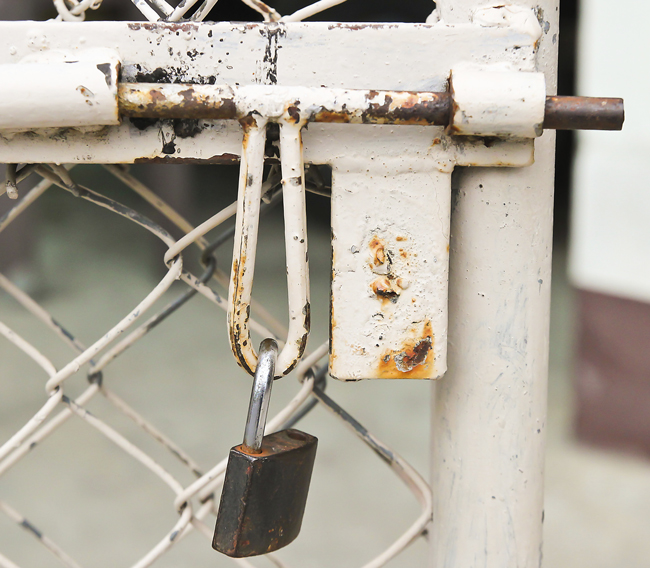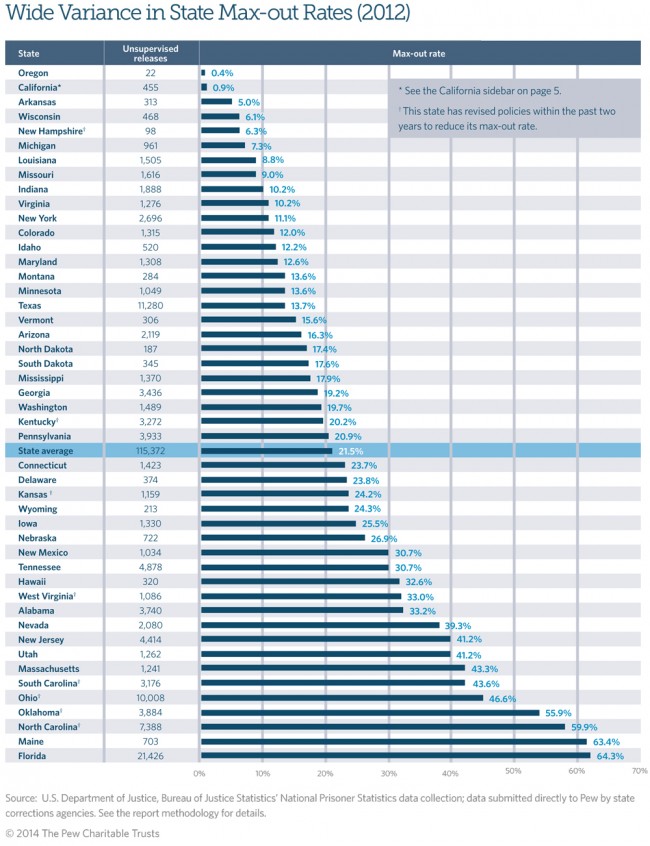
A new study by the Pew Charitable Trusts finds Florida leading the nation in inmates who “max out” their sentences — serving 100 percent of their time and being released with no supervision beyond the prison gates.
The study found that 64.3 percent of Florida inmates, or 21,426 offenders, were released in 2012 without conditions, monitoring or support.
The states with the next-highest rates were Maine with 63.4 percent, or 703 unsupervised releases, and North Carolina with 59.9 percent, or 7,388. The state with the lowest max-out rate was Oregon with 0.4 percent, or 22 unsupervised releases. The average of all states was 21.5 percent.
In Florida, the study’s results drew varying reactions from policymakers and people knowledgeable about the criminal-justice system.
“You can go in Florida from solitary confinement to the street, and that’s probably not a good thing,” said Allison DeFoor, chairman of the Project on Accountable Justice at Florida State University and a former Monroe County sheriff and judge.
He agreed with the Pew study’s recommendation that states require a period of post-prison supervision for all offenders to reduce recidivism and costs.
“I’ve had plenty of clients, when I was a criminal defense attorney, say, ‘I’ll take more time and no paper, thank you very much,’ ” DeFoor said. “And they were the seasoned ones, the ones who really knew the system.”

But Polk County Sheriff Grady Judd, president of the Florida Sheriffs Association, pointed to the same data and said, “We should celebrate that we don’t have parole and crime is at a 43-year low. When we had a parole system in Florida where we watched out for people upon their release from prison, they didn’t stay in prison as long, and our crime rate was through the roof.”
Florida abolished parole in 1983 and adopted a system of sentences that are definite and not subject to review by a parole board. Florida was also one of the first states to adopt a truth-in-sentencing law, requiring all offenders who committed crimes on or after Oct. 1, 1995, to serve at least 85 percent of their sentences.
“Since then, the number of inmates maxing out in Florida has risen steadily,” noted the Pew study. In 1990, Florida released approximately 12,000 inmates, or 32 percent of offenders, without supervision. By 2012, the max-out rate had doubled.
Like Judd, House Criminal Justice Chairman Matt Gaetz, R-Fort Walton Beach, said the study findings were good news.
“I’m proud that Florida keeps bad guys and gals behind bars longer than most,” he said.
But Gaetz also said he believes in supervision after release, noting that his committee drafted legislation during the 2014 session cracking down on sexually violent predators, including a split sentence extending supervision “so that in the event that any sexually violent predators were released into the wild, we would be monitoring them extremely closely.”
Senate Criminal and Civil Justice Appropriations Chairman Rob Bradley, R-Fleming Island, also pointed to the low crime rate as a sign the state was on the right track.
“I think it’s a good thing when you have certainty in sentencing,” he said.
Bradley said Florida’s recidivism rate is dropping, from just under 33 percent to less than 30 percent. He also pointed to the opening of re-entry centers, such as one that opened last year in Gadsden County. The centers take prisoners from other institutions within three years of their release dates, providing substance-abuse treatment, vocational training and job-readiness instruction.
“But however we do it, the ultimate goal is to make sure that the individuals have tools to succeed in life after they leave from behind the razor wire,” Bradley said. “And we’re doing that.”
The Pew study maintains that supervised release can cut recidivism and costs, pointing to a study it conducted in New Jersey that found “parolees are less likely be rearrested, reconvicted and re-incarcerated for new crimes than inmates who max out their full prison sentences and are released without supervision. Even when controlling for key risk factors such as age, time served, current offense and criminal history, parolees were 36 percent less likely to return to prison for new crimes within three years of release.”
But Judd said he disagrees with Pew’s recommendation that the state carve out a community-supervision period from inmate prison terms.
“I don’t think we need to spend the extra money,” he said. “I think the 85 percent is benevolent, because they should serve 100 percent. I do believe in re-entry, but those training programs and the re-entry programs must occur while they’re in prison.”
Gaetz agreed, saying the state is providing re-entry preparation on its own terms.
“In Florida, we believe that those re-entry services ought to be offered inside the walls of the state prison, not in some halfway house or provisional release program, to the same frequency that other states use those tools,” he said.
But DeFoor of the Project on Accountable Justice called the Pew study “the opening salvo of the world changing for criminal justice,” predicting that the system would become increasingly data-driven.
“They’re not used to people coming in and saying, ‘This is how you’re performing,’ ” DeFoor said. “But it got too big to be allowed not to be measured.”
–Margie Menzel, News Service of Florida





























m&m says
That’s good. Hopefully it will deter the dirt bags from around the country to come here.
Geezerino says
I am dying to tell an off-color joke with regard to the Florida “penal” system.
But that’s childish….so much for that silliness.
Seriously now, it appears as if we’re hardening the criminals instead of turning them around.
Florida’s penal system is an impotent system, overrun with rampant dysfunction.
They can’t seem to get up their desire to turn offenders around.
But they love to erect more and more prisons.
We need a stand-up guy to run our jails. Maybe run some new ideas up the flagpole.
When the time is right.
It is a prickly situation that’s going to penetrate our society in myriad ways.
But, the system does work occasionally with satisfying results.
ted bundy says
they re offend because they shouldn’t be released in the first place..sentences are way to lenient here..i speak for the majority when i say ,leave them in prison..
Nancy N. says
Sentences are too lenient here? You’ve got to be kidding me! The U.S. locks up more of its citizens, for longer periods, than virtually any other country on the face of the planet. And Florida has some of the strictest sentencing laws in this country. Which makes the State of Florida one of the most penal jurisdictions on the planet! We lock up a higher percentage of our citizens every year than some of the world’s worst dictators do. We should not be proud of that.
“Lenient” sentences are not the problem! In fact it is just the opposite. We send people to prison for minor issues when what they really need to return constructively to society is mental health or drug addiction help. Instead of offering those to people, we just lock them up and expect that to fix everything. Instead, they get out a few years later with no work experience or skills, unemployable due to a felony record, often heavily in debt due to fines, family relationships fractured due to their incarceration, and with the problems that they were locked up for still unsolved. We take broken people and break them even more. Our penchant for locking people up has created an entire underclass of people in this state that can’t vote, can’t work, and have severe problems that no one wants to help because of their “record”. Untouchables.
In Europe and many other countries around the world, they lock up far fewer of their citizens and have a much lower crime rate, because they pay attention to mental health and addiction issues and devote resources to helping these people fix their problems. We could learn some lessons from them.
Let's see now says
They need not simply have their hands “slapped” on their first offense to begin with. Perhaps if when they start their criminal behaviors to begin with, if our system cracked down on ’em hard enough then, we may see these behaviors begin to turn at the beginning at the prisons might start to slow down on filling up. that’s only if we actually had the guts to follow through on our initial statute requirements to begin with.
Sherry Epley says
Right on, as usual Nancy N.! Those who “think” they speak for the majority most certainly should not and do not speak for me and for the millions of educated, caring people who are humane enough to understand that many people are imprisoned unjustly and many have been found completely innocent of all charges with the advent of DNA evidence. Even those who “did the crime” still deserve a chance of rehabilitation and the chance of a decent life after they have served their time.
The hatred of humanity spewed in these comments is despicable! Karma is a tough fate distributor. May your destiny be kinder than you deserve.
Elana Lee says
Nancy and Sherry, I agree with you. Those who think they are speaking for the majority indeed are not speaking for me, either.
I know of a young man in his early 30’s, who I’m sure would not be able to even get an interview in Florida, let alone get a job, even with job training. He was arrested, tried, and indeed he was found guilty. A convicted felon. He was given the death penalty. Some think he deserved what he got, others think not. I guess there were some who joined in the mob mentality with the name calling of “dirt bag”, “scum” and “pos”. He served some time before he was executed. The man’s name is Jesus Christ. I think it was him who said, “Whatever you do unto the least of these my brethren, you do unto me.” Nancy N., is it any wonder that America has more of our own (non-violent) citizens incarcerated than any other nation on earth? I daresay we are the least compassionate and most barbaric population of adult bullies to have devolved to this all time low.
Sherry Epley says
Very well said Elana Lee. . . especially your last line! I agree completely! There are times when I shudder to think about where our cultured is headed. Why is it that even the religious among us do not remember that when we discriminate against fellow human beings and say hateful thing about them, we are talking about our fellow brothers and sisters? Where is the compassion and forgiveness?